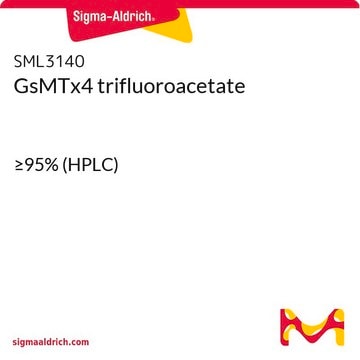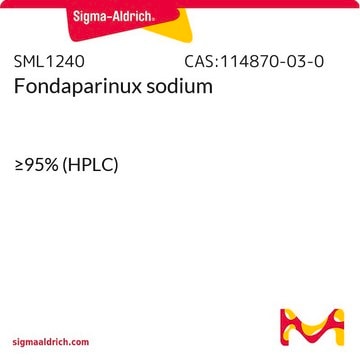All Photos(1)
About This Item
Empirical Formula (Hill Notation):
C38H50N3O6Cl
CAS Number:
Molecular Weight:
680.27
UNSPSC Code:
12352107
NACRES:
NA.77
Recommended Products
Quality Level
Assay
≥98% (HPLC)
form
powder
color
blue to black
solubility
DMSO: 2 mg/mL, clear
storage temp.
2-8°C
General description
GlucoseCy5 is a cell-permeable, Cy5-linked 1-amino-1-deoxy-β-glucose fluorescent tracer. It is used for glucose transporter (GLUT)-mediated molecular sensing and bioimaging. GlucoseCy5 demonstrates superior specificity, sensitivity, and non-toxicity over 2-NBDG. λ emission & excitation ~ 644 nm & 665 nm. Suggested optimum concentration and incubation for cellular uptake: 50 μM & 20 min.
Application
GlucoseCy5 has been used as a component in serum-free Dulbecco′s modified eagle medium (DMEM) for fluorescence-activated cell sorting (FACS) and glucose-uptake assay.
Storage Class Code
11 - Combustible Solids
WGK
WGK 3
Flash Point(F)
Not applicable
Flash Point(C)
Not applicable
Choose from one of the most recent versions:
Certificates of Analysis (COA)
Lot/Batch Number
Don't see the Right Version?
If you require a particular version, you can look up a specific certificate by the Lot or Batch number.
Already Own This Product?
Find documentation for the products that you have recently purchased in the Document Library.
Hu Xu et al.
Biochemical and biophysical research communications, 474(2), 240-246 (2016-04-02)
Two novel cyanine-based 1-amino-1-deoxy-β-glucose conjugates (Glu-1N-Cy3 and Glu-1N-Cy5) were designed, synthesized and their fluorescence characteristics were studied. Both Glu-1N-Cy3 and Glu-1N-Cy5 accumulate in living HT29 human colon cancer cells, which overexpress glucose transporters (GLUTs). The cellular uptake of the bioprobes
Transcriptional metabolic reprogramming implements meiotic fate decision in mouse testicular germ cells
Zhang X, et al.
Cell Reports (2023)
Metabolic support of tumour-infiltrating regulatory T cells by lactic acid
Watson MJ, et al.
Nature (2021)
McLane J Watson et al.
Nature, 591(7851), 645-651 (2021-02-17)
Regulatory T (Treg) cells, although vital for immune homeostasis, also represent a major barrier to anti-cancer immunity, as the tumour microenvironment (TME) promotes the recruitment, differentiation and activity of these cells1,2. Tumour cells show deregulated metabolism, leading to a metabolite-depleted
Xiangyin Liu et al.
Biochemical and biophysical research communications, 480(3), 341-347 (2016-10-26)
Two novel fluorescent bioprobes, namely, 6N-Gly-Cy3 and 6N-Gly-Cy5, were designed and synthesized for real-time glucose transport imaging as well as potentially useful tracer for galactokinase metabolism. The structure of the bioprobes was fully characterized by 1H NMR, 13C NMR, IR
Our team of scientists has experience in all areas of research including Life Science, Material Science, Chemical Synthesis, Chromatography, Analytical and many others.
Contact Technical Service
![2-Deoxy-2-[(7-nitro-2,1,3-benzoxadiazol-4-yl)amino]-D-glucose ≥97% (HPLC)](/deepweb/assets/sigmaaldrich/product/structures/104/527/40bd5a41-ebc4-484e-a10e-891fecfaea79/640/40bd5a41-ebc4-484e-a10e-891fecfaea79.png)





